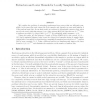121
click to vote
ECCC
2011
14 years 9 months ago
2011
A fundamental fact in the analysis of randomized algorithm is that when n balls are hashed into n bins independently and uniformly at random, with high probability each bin contai...
155
Voted
ECCC
2011
14 years 9 months ago
2011
We develop a new technique for proving lower bounds in property testing, by showing a strong connection between testing and communication complexity. We give a simple scheme for r...
234
Voted
ECCC
2011
14 years 9 months ago
2011
136
click to vote
ECCC
2011
14 years 9 months ago
2011
We revisit the notion of a targeted canonical derandomizer, introduced in our recent ECCC Report (TR10-135) as a uniform notion of a pseudorandom generator that suffices for yield...
131
click to vote
ECCC
2011
14 years 9 months ago
2011
We show two new direct product results in two different models of communication complexity. Our first result is in the model of one-way public-coin model. Let f ⊆ X × Y × Z ...
130
click to vote
ECCC
2011
14 years 9 months ago
2011
We consider the problem of extracting randomness from sources that are efficiently samplable, in the sense that each output bit of the sampler only depends on some small number d ...



